| Srl | Item |
| 1 |
ID:
139679


|
|
|
|
|
| Summary/Abstract |
This article analyses how, at the time of the Japanese military expansion across Asia in the 1930s and 1940s, the category of ‘Burma Chinese’ and notions of ‘Chineseness’ acquired meaning through the movement across Chinese and Indian borders of residents of Burma identified as Chinese. Focusing on the terminology utilized by various reporting organizations to refer to evacuees, refugees or returnees, this article asks what we can learn from bureaucratic exchanges and practices of documentation about the wartime migration of Burma Chinese. I argue that a shared racial logic of territorialization operates across divergent sets of correspondence concerned with the repatriation of Burma Chinese to Burma. Multiple acts of iteration and practical implementation of categories naturalized this racial logic with respect to Burma Chinese in the latter half of the 1940s. Understanding how the work of repatriating Burma Chinese rested upon a shared racial logic is important because the regulation of Asian wartime migration was foundational to the emerging international refugee regime and post-Second World War world order.
|
|
|
|
|
|
|
|
|
|
|
|
|
|
|
|
| 2 |
ID:
158544


|
|
|
|
|
| Summary/Abstract |
The recent rise of return migrants in rural China has resulted in much debate about whether the migration experience increases villagers' likelihood of becoming self-employed in non-farm jobs. Using data from a rural household survey conducted in 2010 (N=2,276), we find that returnees are significantly more likely to become self-employed than those with no migration experience. The overall result remains the same while taking human capital, political capital, social capital, as well as demographic background into account, and controlling for family conditions between family wealth and the number of family laborers. We also show that while the positive effect of family wealth on self-employment is stronger among returnees than among non-migrants, the negative effect of the number of family laborers on self-employment is not significant among returnees. This suggests that returnees are better able to mobilize family support on the one hand and minimize the resources dilution problem on the other. Taken together, this article contributes to the current literature by highlighting the interaction of migration and family conditions in shaping how returnees affect their natal communities in rural China.
|
|
|
|
|
|
|
|
|
|
|
|
|
|
|
|
| 3 |
ID:
178005


|
|
|
|
|
| Summary/Abstract |
Mali has one of the highest migration rates in Africa, but we still know very little about the processes and drivers of migration – particularly in the context of the current political crisis. This article draws on 27 focus groups with 220 returnees and male youth respondents conducted in the summer of 2018. Respondents cite underemployment and the inability to provide for relatives as well as a feeling of hopelessness about a future life in Mali as drivers of migration. Returnees report that the voyage was more difficult than anticipated. However, even with knowledge of the significant risks they face, most (68%) returnees express a desire to try to migrate again: this is particularly true for returned migrants who failed in an attempt to reach Europe (89%). The research illustrates very different experiences for migrants attempting to reach Europe and those with goals of intra-African migration
|
|
|
|
|
|
|
|
|
|
|
|
|
|
|
|